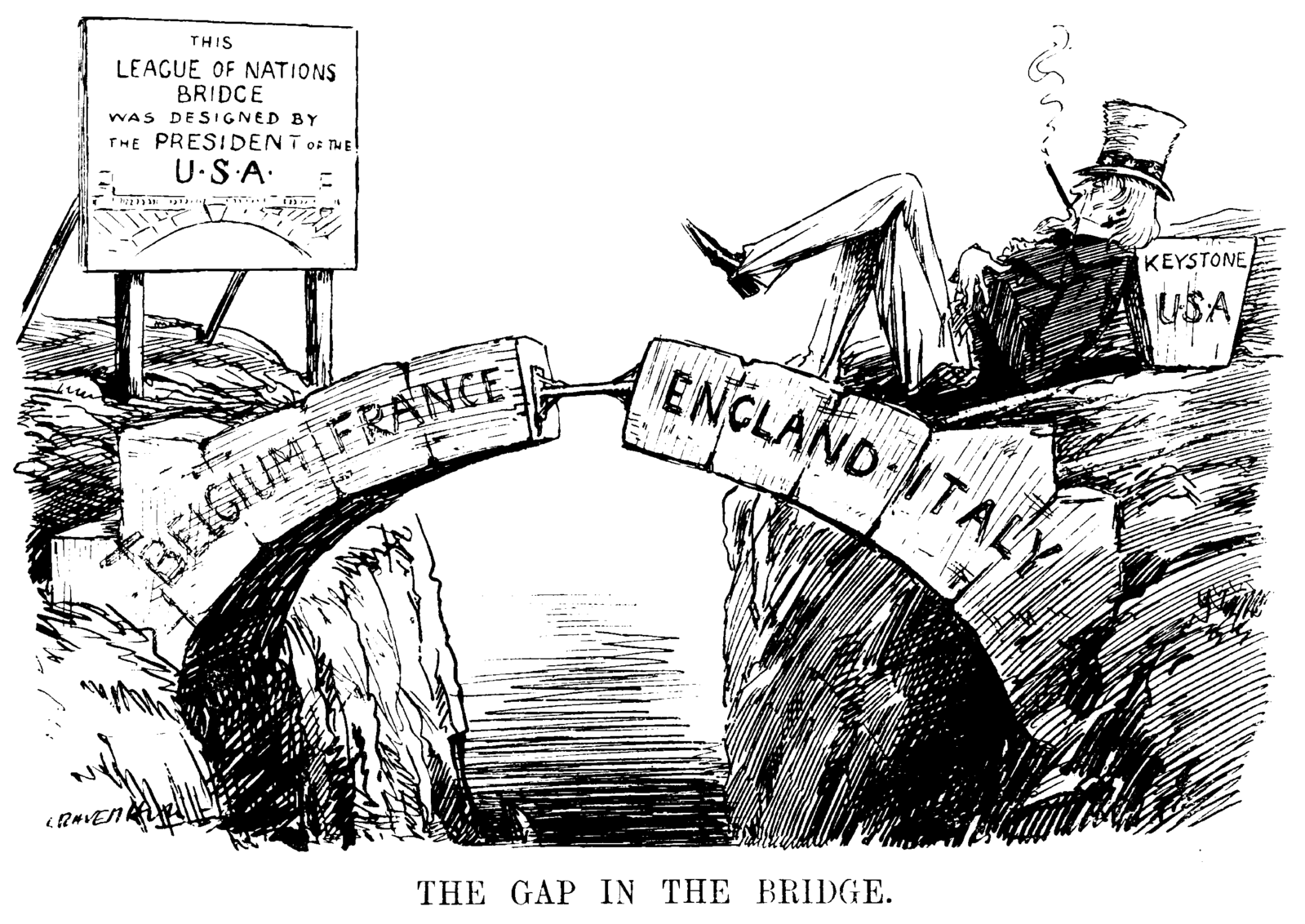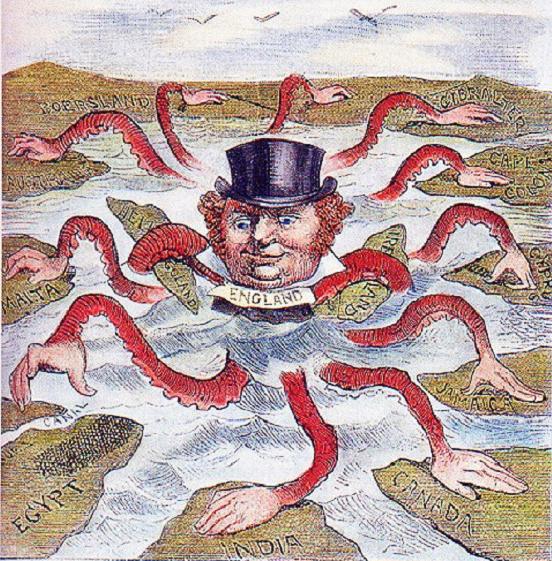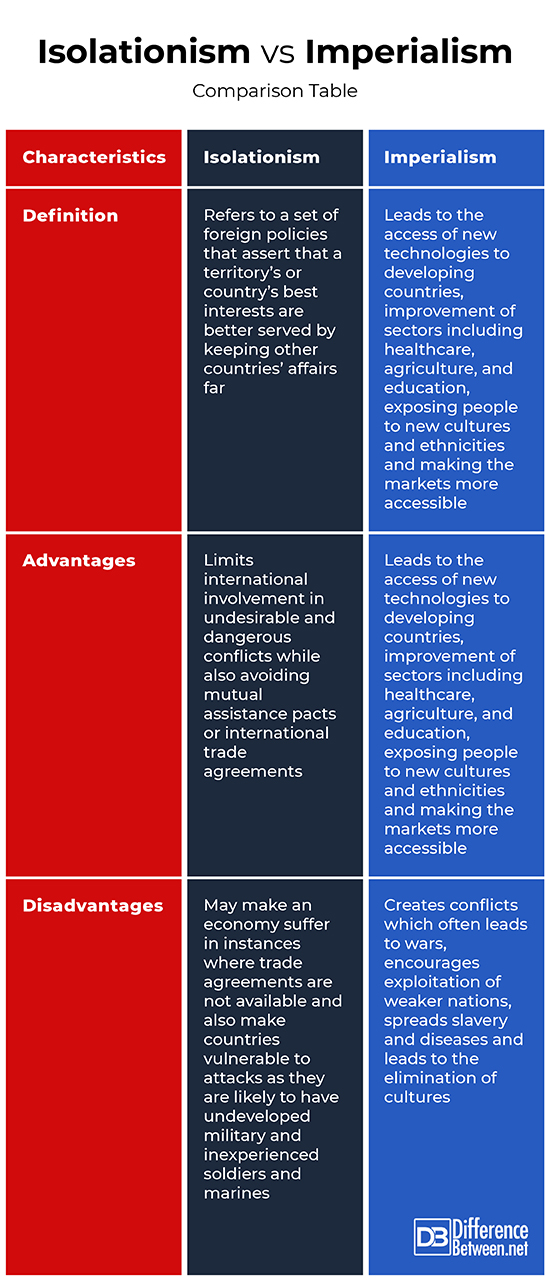Difference Between Isolationism and Imperialism
When countries, territories or nations are in distress, the decision on whether to help and how to help is not one that is made overnight. Before any action is taken, the responsibility of the government based on the situation, whether people want to be free or ruled and whether other countries should interfere with a nation’s internal issues must be considered. Among common policies that govern these situations include isolationism and imperialism.

What is Isolationism?
This is a set of foreign policies that assert that a territory’s or country’s best interests are better served by keeping other countries’ affairs far. It aims to make a nation self-reliant by devoting its efforts to its advancement.
Advantages of isolationism include:
- It limits international involvement in undesirable and dangerous conflicts
- Cancels mutual assistance pacts or international trade agreements.
Disadvantages of isolationism include:
- An economy may suffer in instances where trade agreements are not available.
- Countries may also become vulnerable to attacks as they are likely to have undeveloped military and inexperienced soldiers and marines.
Among countries that have experienced isolationism include Albania, Bhutan, China, Japan, Korea, the United States and Paraguay.

What is Imperialism?
A concept that arose in the modern age, this is a policy of extending the authority or rule of a country over other people or a nation either by gaining economic control, political control or military force.
Motives of imperialism include:
- Economic motives- This was done to gain an economic advantage through access to cheap labour, control of natural resources and markets.
- Exploratory motives- This involves exploring a nation for scientific research, adventure or medical research.
- Ethnocentric motives- This is the belief that one’s cultural beliefs and practices are more superior than others. Nations can hence help other countries with the aim of passing their belief to them.
- Political motives- Usually a competition for supremacy, this is used to gain national security, prestige and pride.
- Religious motives- Christian missionaries for instance used religion to spread western cultural values.
Advantages of imperialism include;
- Access to new technologies to developing countries
- Improvement of sectors including healthcare, agriculture, and education
- People are exposed to new cultures and ethnicities
- Better marker access
However, it has disadvantages including;
- It creates conflicts which often leads to wars
- The exploitation of weaker nations
- Spreads slavery and diseases
- Leads to the elimination of cultures
Similarities between Isolationism and Imperialism
- Both are policies regarding crossing other nations or countries boundaries
Differences between Isolationism and Imperialism
Definition
Isolationism refers to a set of foreign policies that assert that a territory’s or country’s best interests are better served by keeping other countries’ affairs far. On the other hand, imperialism refers to a policy of extending the authority or rule of a country over other people or a nation either by gaining economic control, political control or military force.
Advantages
Isolationism limits international involvement in undesirable and dangerous conflicts while also avoiding mutual assistance pacts or international trade agreements. On the other hand, imperialism leads to the access of new technologies to developing countries, improvement of sectors including healthcare, agriculture, and education, exposing people to new cultures and ethnicities and making the markets more accessible.
Disadvantages
While isolationism may make an economy suffer in instances where trade agreements are not available and also make countries vulnerable to attacks as they are likely to have undeveloped military and inexperienced soldiers and marines, imperialism creates conflicts which often leads to wars, encourages exploitation of weaker nations, spreads slavery and diseases and leads to the elimination of cultures.
Isolationism vs. Imperialism: Comparison Table

Summary of Isolationism and Imperialism
Isolationism refers to a set of foreign policies that assert that a territory’s or country’s best interests are better served by keeping other countries’ affairs far. On the other hand, imperialism refers to a policy of extending the authority or rule of a country over other people or a nation either by gaining economic control, political control or military force. Although both have their pros and cons, it is important to respect other countries’ boundaries and laws to avoid conflicts that could turn into a war.
- Difference Between Profit Center and Investment Center - July 2, 2022
- Difference Between Anti-Trust and Anti-Competition - June 6, 2022
- Difference Between Stocktaking and Stock Control - June 6, 2022
Search DifferenceBetween.net :
Leave a Response
References :
[0]Weber J. & Streissguth T. Isolationism. Infobase Publishing, 2010. https://books.google.co.ke/books?id=YugJ424jj4MC&pg=PA1&dq=Isolationism&hl=en&sa=X&ved=2ahUKEwj4jf6KnYLrAhVKXRoKHeoODCEQ6AEwAHoECAMQAg#v=onepage&q=Isolationism&f=false
[1]Helga Turku. Isolationist States in an Interdependent World. Ashgate Publishing, Ltd., 2013. https://books.google.co.ke/books?id=lnRneRWXT44C&pg=PA27&dq=Isolationism&hl=en&sa=X&ved=2ahUKEwj4jf6KnYLrAhVKXRoKHeoODCEQ6AEwA3oECAAQAg#v=onepage&q=Isolationism&f=false
[2]Vladimir Lenin. Imperialism: The Highest Stage of Capitalism. Resistance Books, 1999. https://books.google.co.ke/books?id=RfKMOwRb1-kC&printsec=frontcover&dq=Imperialism&hl=en&sa=X&ved=2ahUKEwjW5d2LnYLrAhXCxIUKHRSyCOIQ6AEwA3oECAQQAg#v=onepage&q=Imperialism&f=false
[3]Image credit: https://commons.wikimedia.org/wiki/File:English_imperialism_octopus.jpg
[4]Image credit: https://commons.wikimedia.org/wiki/File:The_Gap_in_the_Bridge.png
